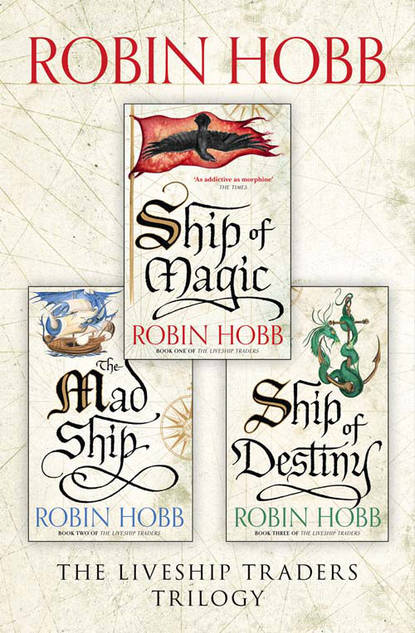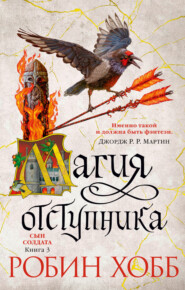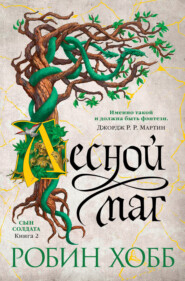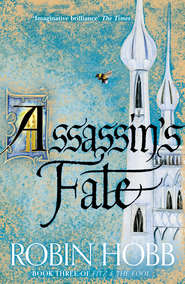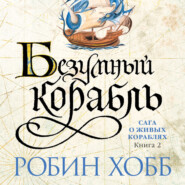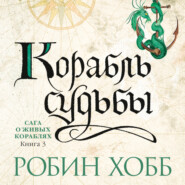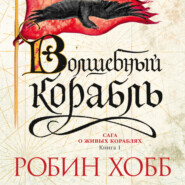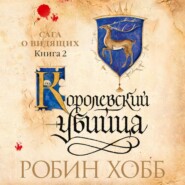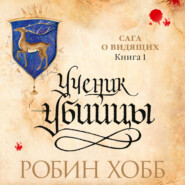По всем вопросам обращайтесь на: info@litportal.ru
(©) 2003-2025.
✖
The Complete Liveship Traders Trilogy: Ship of Magic, The Mad Ship, Ship of Destiny
Автор
Год написания книги
2018
Настройки чтения
Размер шрифта
Высота строк
Поля
Wintrow thought he was unaware of him until the other boy’s eyes darted briefly to his. His fingers stilled. ‘What?’ he demanded, not taking the instrument from the side of his face.
‘Nothing. You on watch?’
‘Sort of. Not much to watch for.’
‘Pirates?’ Wintrow ventured.
Mild snorted. ‘They don’t bother a liveship, usually. Oh, I’ve heard rumours from when we were in Chalced, that one or two got chased, but for the most part they leave us alone. Most liveships can outrun any wooden ship under identical conditions, unless the liveship has a really carp crew. And the pirates know that even if you catch up with a liveship, you’re in for the fight of your life. And even if they win, what do they have? A ship that won’t sail for them. I mean, do you think Vivacia would welcome strangers aboard her and accept them running her? Not much!’
‘Not much,’ Wintrow agreed. He was pleasantly surprised — both by Mild’s obvious affection and pride for the ship, and by the boy’s conversation with him. Mild seemed flattered by the boy’s rapt attention, for he narrowed his eyes knowingly and went on, ‘The way I see it, right now the pirates are doing us a big favour.’
Wintrow bit. ‘How?’
‘Well. How to explain it… you didn’t get ashore in Chalced, did you? Well, what we heard there was that pirates were suddenly attacking some of the slavers. At least one taken, and rumours of others being threatened. Well. It’s end of autumn now, but by spring, Chalced needs a powerful lot of slaves to do the spring ploughing and planting. If pirates are picking off the regular slavers, well, by the time we run into Chalced with a prime load, it will be a seller’s market. We’ll get so much for our haul, we can probably go straight home to Bingtown.’
Mild grinned and nodded in satisfaction, as if somehow Kyle getting a good price for slaves would reflect well on him. He was likely only repeating what he’d heard the elders of the crew say. Wintrow said nothing. He looked far out over the heaving water. There was a heavy, sick place under his heart that had nothing to do with sea-sickness. Whenever he thought forward to Jamaillia and the actual act of his father buying slaves to sell, a terrible sorrow welled up in him. It was like having the guilt and pain of a shameful memory in advance of the event. After a moment, Mild picked up the conversation again.
‘So. Torg’s got you up here again?’
‘Yeah.’ Wintrow surprised himself, stretching his shoulders and then leaning back casually against his grip. ‘Doesn’t bother me so much any more.’
‘I can tell. That’s why they do it.’ When Wintrow lifted his brows, Mild grinned at him. ‘Oh, you thought it was a special torture just for you? No. Torg likes picking on you. Sa’s balls, Torg likes picking on anyone. Anyone he can get away with, anyway. But running the ship’s boy up and down the mast is a tradition. When I first come aboard, I hated it. Brashen was mate then, and I thought he was the son of a sow. Once he realized I was nervous about coming up here, he saw to it that every one of my meals ended up here. “You want to eat, go get it,” he’d tell me. And I’d have to climb the mast and crawl around up here until I found a bucket with my mess in it. Damn, I hated him. I was so scared and slow, my food was almost always cold when I found it, and half the time there’d be rain sloshing around with it. But I learned, same as you, not to mind it after a while.’
Wintrow was silent, thinking. Mild’s fingers danced again over the keys, picking out a lively little tune. ‘Then Torg doesn’t hate me? This is some kind of training?’
Mild stopped with a snort of amusement. ‘Oh, no. Depend on it. Torg hates you. Torg hates everyone that he thinks is smarter than he is, and that’s most of us aboard. But he knows his job, too. And he knows that if he wants to keep it, he’s got to make you into a sailor. So, he’ll teach you. He’ll make it as painful and unpleasant as he can, but he’ll teach you.’
‘If he’s such a hateful person, why does my… the captain keep him on as second mate?’
Mild shrugged. ‘Ask your Da,’ he said cruelly. Then he grinned, almost making that a joke. He went on, ‘I hear that Torg had been with him quite a while, and stuck with him on a real bad trip on the ship they used to be on. So when he came to the Vivacia, he brought Torg with him. Maybe no one else would hire him and he felt an obligation. Or maybe Torg’s got a nice tight arse.’
Wintrow’s jaw went slack at the implication. But Mild was grinning again. ‘Hey, don’t take it so serious. No wonder everyone loves to tease you, you’re such a mark.’
‘But he’s my father,’ Wintrow protested.
‘Naw. Not when you’re serving aboard his ship. Then he’s just your captain. And he’s an okay captain, not as good as Ephron was, and some of us still think Brashen should have took over when Cap’n Vestrit stepped off. But he’s okay.’
‘Then why did you say… that about him?’ Wintrow was genuinely mystified.
‘Because he’s the captain,’ Mild laboriously explained. ‘Sailors always say and do like that, even if you like the man. Because you know he can shit on you any time he wants. Hey. You want to know something? When we first found out that Cap’n Vestrit was getting off and putting a new man on, you know what Comfrey done?’
‘What?’
‘He went to the galley and took the cap’n’s coffee mug and wiped the inside with his dick!’ Delight shone in Mild’s grey eyes. He waited in anticipation for Wintrow’s reaction.
‘You’re teasing me again!’ A horrified smile dawned on his face despite himself. It was disgusting, and degrading. It was too outrageous to be true, for a man to do that to another man he hadn’t even met yet, just because that man would have power over him. It was unbelievable. And yet… and yet… it was funny. Suddenly Wintrow grasped something. To do that to a man you knew would be cruel and vicious. But to do that to an unknown captain, to be able to look up at the man who had life and death power over you and imagine him drinking the taste of your dick with his coffee… He looked aside from Mild, feeling with disbelief the broad grin on his face. Comfrey had done that to his father.
‘Crew’s gotta do a few things to the cap’n, and the mate. Can’t let them get away with always thinking they’re gods and we’re dung.’
‘Then… you think they know about stuff like that?’
Mild grinned. ‘Can’t be around the fleet too long and not know it goes on.’ He twanged a few more notes, then shrugged elaborately. ‘They probably just think it never happens to them.’
‘Then no one ever tells them,’ Wintrow clarified for himself.
‘Of course not. Who’d tell?’ A few notes later, Mild stopped abruptly. ‘You wouldn’t, would you? I mean, even if he is your Da and all…’ His voice trailed off as he realized that he might have been very indiscreet.
‘No, I wouldn’t tell,’ Wintrow heard himself say. He found a foolish grin on his face as he added wickedly, ‘But mostly because he is my father.’
‘Boy? Boy, get your arse down here!’ It was Torg’s voice, bellowing up from the deck.
Wintrow sighed. ‘I swear, the man can sense when I’m not miserable, and always takes steps to correct it.’
Wintrow began the long climb down. Mild leaned over slightly to watch his descent and called after him, ‘You use too many words. Just say he’s on your arse like a coat of paint.’
‘That, too,’ Wintrow agreed.
‘Move it, boy!’ Torg bellowed again, and Wintrow gave all his attention to scrambling down.
Much later that night, as he meditated in forgiveness of the day, he wondered at himself. Had not he laughed at cruelty, had not his smile condoned the degradation of another human being? Where was Sa in that? Guilt washed over him. He forced it aside; a true priest of Sa had little use for guilt. It but obscured; if something made a man feel bad then he must determine what about it troubled him, and eliminate that. Simply to suffer the discomforts of guilt did not indicate a man had improved himself, only that he suspected he harboured a fault. He lay still in the darkness and pondered what had made him smile and why. And for the first time in many years, he wondered if his conscience were not too tender, if it had not become a barrier between him and his fellows. ‘That which separates is not of Sa,’ he said softly to himself. But he fell asleep before he could remember the source for the quote, or even if it were from scripture at all.
Their first sighting of the Barrens came on a clear cold morning. The voyage northeast had carried them from autumn to winter, from mild blue weather to perpetual drizzle and fog. The Barrens crouched low on the horizon. They were visible not as proper islands, but only as a place where the waves suddenly became white foam and spume. The islands were low and flat, little more than a series of rocky beaches and sand plains that chanced to be above the high tide line. Inland, Althea had heard there was sand and scrubby vegetation and little more than that. Why the sea-bears chose to haul out there, to fight and mate and raise their young, she had no idea. Especially as each year at this time, the slaughter boats came to drive and kill hundreds of their kind. She squinted her eyes against the flying salt spray and wondered what kind of deadly instinct brought them back here every year despite their memories of blood and death.
The Reaper came into the lee of the cluster of islands at about noon, only to find that one of their rivals had already claimed the best anchorage. Captain Sichel cursed at that, cursed as if it were somehow the fault of his men and his ship that the Karlay had beaten them here. Anchors were set and the hunters roused from their stupor of inactivity. Althea had heard that they’d quarrelled over their gambling a few days ago and all but killed one of their number who they’d suspected of cheating. It was nothing to her; they were foul-mouthed and ill-tempered on the occasions when she’d had to fetch for them in her duties as ship’s boy. She was not at all surprised they were turning on one another in their close quarters and idleness. And what they did to one another was no concern to her at all.
Or so she had thought. It was when they were safely anchored and she was looking forward to the first day of comparative quiet that they’d had in weeks that she suddenly discovered that it would affect her. Officially, she was off-duty. Most of her watch were sleeping, but she had decided to take advantage of the light and the relatively quiet weather to mend some of her clothes. Doing close work by lanternlight had begun to bother her eyes of late, to say nothing of the close air below decks. She’d found a quiet corner, in the lee of the house. She was out of the wind and the sun had miraculously found them despite the edge of winter in the air. She had just begun to cut squares of canvas from her worst worn pair of trousers to patch the others when she heard the mate bellow her name.
‘Athel!’ he roared, and she leapt to her feet.
‘Here, sir!’ she cried, heedless of the work that had spilled from her lap.
‘Get ready to go ashore. You’ll be helping the skinners; they’re short a man. Lively, now.’
‘Yessir,’ she replied, as it was the only possible reply, but her heart sank. That did not slow her feet, however. She snatched up her work and carried it down the hatch with her, and set it aside to finish on some unforeseeable tomorrow. She jammed her calloused feet into felted stockings and heavy boots. The barnacled rocks would not be kind to bare feet. She snugged her knit cap more closely about her ears and dashed back up the steps to the deck. She was not a moment too soon, for the boats were already being raised by the davits. She lunged into one and took a place at an oar.
The sailors manned the oars while the hunters hunched their shoulders to the spray and icy wind and grinned at one another in anticipation. Favourite bows were gripped and held well out of the water’s reach, while oiled bags of arrows rolled sluggishly in the shallow bilge water of the skiff. Althea leaned hard on her oar, trying to match her companion. The boats of the Reaper moved together toward the rocky shores of the islands, each with a complement of hunters, skinners and sailors. She noticed, almost in passing, that Brashen pulled at the oars in one of the other boats. He’d be in charge of the sailors ashore then, she decided. She resolved to give him no reason to notice her. She’d be working with the hunters and skinners anyway; there was no need for their paths to cross. For an instant she wondered just what her task would be, then shrugged it off as useless curiosity. They’d tell her, soon enough.
Just as the rival ship had taken the best anchorage, so too her hunters had taken the prime island. By tradition the ships would not encroach on one another’s hunting territories. Past experience had taught them all that it led only to dead men and less profit for all. So the island where they put ashore was bare of all other human life. The rocky beaches were deserted, save for some very old sows resting in the shallows. The adult males had already left, beginning the migration back to wherever these creatures wintered. On the sandy inland plains, Althea knew they would find the younger females and this year’s crop of offspring. They would have lingered there, feeding off the late runs of fish and gathering fat and strength before they began their long journey.
The hunters and skinners remained in the boats when the rowers jumped overboard into the shallows and seized the gunwales of the skiffs to run the boats ashore. They timed this action to coincide with a wave to help them lift the boat clear of the sharp rocks. Althea waded out on the beach with the others, her soaked legs and wet boots seeming to draw in the cold.
Once ashore, she quickly found her duties, which seemed to be to do whatever the hunters and skinners didn’t care to do for themselves. She was soon burdened with all the extra bows, arrows, knives and sharpening stones. She followed the hunters inland with her arms heavily laden. It surprised her that the hunters and skinners walked so swiftly and talked so freely amongst themselves. She would have supposed this hunt to require some kind of stalking and stealth.
Instead, at the top of the first rise, the gently rolling interior of the island was revealed to her. The sea-bears sprawled and slept in clusters on the sand and amongst the scrub brush. As the men crested the hill, the fat creatures scarcely deigned to notice them. Those that did open their eyes regarded their approach with as little interest as they took in the dung-picker birds that shared their territory.
The hunters chose their positions. She was speedily relieved of the bags of arrows she had carried for them. She stood well back of them as they strung their bows and selected their targets. Then the deadly rain of arrows began. The animals they struck bellowed and some galloped awkwardly in circles before they died, but the creatures did not appear to associate their pain and deaths with the men upon the rise above them. It was almost a leisurely slaughter, as the hunters chose target after target and sent arrows winging. The throats were the chosen targets, where the broad-headed arrows opened the veins. Blood spilled thick. That was the death they meted out, that animals might bleed to death. This left the supple furs of their hides intact, as well as yielding meat that was not too heavy with blood. Death was not swift, nor painless. Althea had never seen much of meat-slaughter, let alone killing on such a scale. It repulsed her, and yet she stood and watched, as she was sure a true youth would have done, and tried not to let her revulsion show on her face.
The hunters were businesslike about their killing. As soon as the final arrows were expended, they moved down to reclaim them from the dead beasts, while the skinners came behind them like gorecrows to a battle scene. The bulk of the live animals had moved off in annoyance from the struggles and bellows of those struck and dying. They still seemed to feel no panic, only a distaste for the odd antics that had disturbed their rest. The leader of the hunters glanced at Althea in some annoyance. ‘See what’s keeping them with the salt,’ he barked at her, as if she had known she would have this duty and had neglected it. She scrambled to this command, just as glad to leave the scene of slaughter. The skinners were already at work, stripping the hide from each beast, salvaging tongues, hearts and livers before rolling the entrails out of the way and leaving the naked fat-and-meat creatures on their own hides. The knowledgeable gulls were already coming to the feast.





